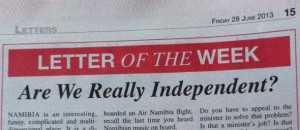NAMIBIA is an interesting, funny, complicated and multi-dimensional place. We are a diverse nation, in both our ethnic make-up and languages, where one can walk on Independence Avenue and hear a person speak Otjiherero, Oshiwambo, English and Afrikaans, not in the same conversation….but in one sentence!
There are many great things in our country that are the envy of people from all over the world.
But, Namibia is also a land of many contradictions. On the one hand we are a very proud people, proud of who we are, of how others see us but at the same time we seem to lack pride in ourselves, our identities and our cultures.
Think of how difficult it is to find books about us by us. Think of how many times you’ve complained about the way taxis drive all over the country; now think of the number of times you have seen traffic police stopping a taxi and issuing them a ticket for a fine. Think of how many times you have complained of bad service in a store and recall the number of times you have walked out of a business because of bad attitudes.
If you have gone through Hosea Kutako International Airport, one of the main gateways into the country, you will find little or no souvenirs of Namibia by Namibians, and if you have ever boarded an Air Namibia flight, recall the last time you heard Namibian music on board.
Think of how hard it is to find music by our talented local artists or to find sports jerseys of our national teams. You need to go to specialised stores or small boutiques to find what you are looking for instead of it being readily available. But, you can find South African jerseys and music in sections labelled as “local”.
Judging by the amount of things that are in our stores and on our grocery shelves with tags written “Made in [insert country of choice here]”, it is not unpatriotic to question how really independent we are. The contradiction here is that we complain of unemployment. Do we really need to import that much chicken and matches? Do we really need to export as much raw materials as we do? Can we not process more of it in our country and create jobs here at home?
This is not about blaming the government. This is about collective responsibility. Rarely do we as a collective or individuals take responsibility for the role we are playing in the system. Take for example, the person complaining to the government in the newspaper about people urinating in the streets when toilets are available just a few metres away. Really? Do you have to appeal to the minister to solve that problem? Is that a minister’s job? Is that even the job of the government? What prevents you from walking up to that person and telling them that it is not OK? If there are no toilets in the community, that can be a failure on the part of the government to provide basic services. However if facilities are available, and they are not being used, that is a problem for the community.
Let us collectively take responsibility for our development instead of waiting for the government to come and fix things. Stop throwing garbage out of the window of your car and then complain that the city is getting dirty. We can take responsibility for one another and take action instead of simply looking on as someone is being robbed in broad daylight or shaking our heads when reading stories about domestic violence.
Let us remember that Vision 2030 is an idea that we must turn into a reality. We are not going to simply arrive in the year 2030 and find that everything is perfect; we must do more as individuals to bring about a brighter future for our country through individual and collective actions.
—-
 A version of this post was published in the Namibian Newspaper on 28 June 2013 and awarded letter of the week honours.
A version of this post was published in the Namibian Newspaper on 28 June 2013 and awarded letter of the week honours.
The Namibia Independence image was obtained from Namibia’s 99FM
http://www.99fm.com.na/namibia-coming-of-age

